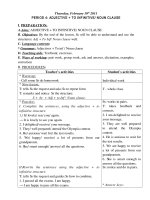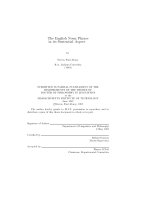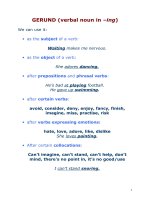Noun clause markers
Bạn đang xem bản rút gọn của tài liệu. Xem và tải ngay bản đầy đủ của tài liệu tại đây (11.67 KB, 1 trang )
Noun clause markers
Recognizing a
noun clause
isn’t all that difficult. They are usually introduced by the conjunctions
that, if
or
whether
. Noun clauses can also be introduced by question words (e.g. how, what, when, where, which, who,
whom, whose, why) and words ending in –ever (e.g. whatever, whenever, wherever etc.)
I don’t know
why she dislikes me.
Whoever said that
was right.
I don’t know
whether she will come.
He told me
that he was quitting.
What he said
infuriated me.
I don’t know
how she managed to do it
.
A clause that comes immediately after a verb is usually a
noun clause
. Some verbs that are commonly followed
by noun clauses are:
know, understand, tell, say, remember, suggest, propose, request, order
etc.
Indirect questions are also noun clauses.
I want to know
when you intend to start
.
She will not tell me
what her name is
.
Yes / No Questions
Yes/no questions
(questions that expect either yes or no as an answer) are also noun clauses. Note that yes/no
questions are usually introduced by the prepositions
if
or
whether.
I would like to know
if you are interested in coming with me.
Note that you cannot decide whether a clause is a noun clause or not just by looking at the word used to introduce
it.
The words that are typically used to introduce clauses can also be used to introduce adjective clauses and adverb
clauses. And this can sometimes be quite confusing. Therefore, instead of looking at the clause marker, students
should analyze what the clause does in a sentence. If it serves as the subject or object of a verb, then it has got to
be a noun clause.
Be first to know when grammar rules change! Sign up to our newsletter here: englishgrammar.org (It's free)
Powered by TCPDF (www.tcpdf.org)









